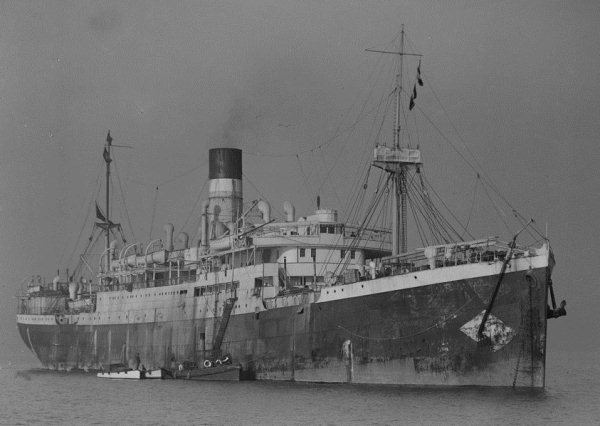City of Cairo
British Steam passenger ship

Photo courtesy of Allan C. Green Collection
| Name | City of Cairo | ||
| Type: | Steam passenger ship | ||
| Tonnage | 8,034 tons | ||
| Completed | 1915 - Earle’s Shipbuilding & Engineering Co Ltd, Hull | ||
| Owner | Ellerman Lines Ltd, London | ||
| Homeport | Liverpool | ||
| Date of attack | 6 Nov 1942 | Nationality: | |
| Fate | Sunk by U-68 (Karl-Friedrich Merten) | ||
| Position | 23° 30'S, 5° 30'W - Grid GF 3811 | ||
| Complement | 311 (104 dead and 207 survivors). | ||
| Convoy | |||
| Route | Bombay (1 Oct) - Durban - Capetown (1 Nov) - Pernambuco, Brazil - UK | ||
| Cargo | 7422 tons of general cargo, including pig iron, timber, wool, cotton, manganese ore and 2000 boxes silver coins | ||
| History | Completed in January 1915. Wreck located and silver recovered
See Record dive rescues $50m wartime silver from ocean floor on BBC. | ||
| Notes on event | On 1 Nov 1942 the City of Cairo (Master William A. Rogerson) left Capetown with 150 passengers, of whom nearly a third were women and children and followed the African coast until she reached a longitude of 23°30S, where she turned westward across the South Atlantic. She was unescorted, only capable of 12 knots and her engines burned smokily. On 6 November, the smoke trail was sighted by U-68 and at 21.36 hours one torpedo struck the City of Cairo. The master gave order to abandon ship and all the women and children left the ship safely, only six people were lost in the evacuation. Merten fired a second torpedo after 20 minutes, which caused the ship to sink by the stern about 450 miles south of St. Helena. Then U-68 questioned the survivors in the six overcrowded lifeboats and left the area. The survivors were over 1000 miles from the African coast, and twice as far from South America. Because of their limited supplies, they set sail for St. Helena. The survivors calculated that they should reach St. Helena in two to three weeks and rationed the drinking water accordingly. Everyone was limited to 110 milliliters a day, even though they were exposed to tropical heat. Over the course of the next three weeks, some of the boats were found by other ships, but others disappeared. 79 crew members, three gunners and 22 passengers were lost. The master and 154 survivors were picked up by the Clan Alpine and landed on St. Helena. 47 survivors were picked up by the British steam merchant Bendoran and landed at Capetown. One boat with 17 people on board had calculated that they reach St. Helena on 20 November, but by the 23, several were already dead and the island was still not in sight. They were certain that they must have missed St. Helena and, rather than circle around in a vain attempt to discover it, they decided to head west to the coast of South America, which they knew to be a further 1500 miles distant. On 27 December, after a voyage of 51 days, two exhausted survivors (third officer J. Whyte and passenger Margaret Gordon) were picked up by Caravelas (C 5), only 80 miles off the coast and landed at Recife. The third officer was awarded the MBE and was repatriated on City of Pretoria, but died when this ship was sunk by U-172 (Emmermann) on 4 March 1943. The woman was awarded the BEM and refused to cross the Atlantic until the war was over. Three survivors were picked up by the German blockade runner Rhakotis (Kapitän z.S. Jacobs) on a voyage from Japan to Bordeaux. On 1 Jan 1943 the ship was torpedoed and sunk by HMS Scylla (98) (Capt I.A.P. Macintyre, CBE, DSO, RN) about 200 miles northwest of Cape Finisterre. One of the survivors from City of Cairo died. The remaining two men were picked up by U-410 (Sturm) and landed as prisoners at St. Nazaire three days later. | ||
| More info | |||
| On board | We have details of 114 people who were on board. | ||
If you can help us with any additional information on this vessel then please contact us.
Media links
|
As an Amazon Associate uboat.net earns a commission from qualifying purchases.

